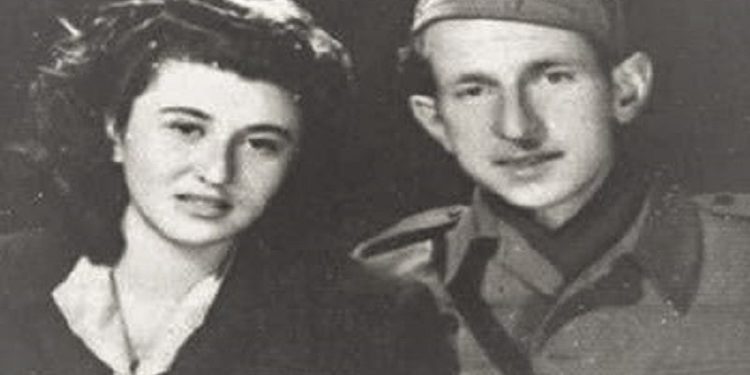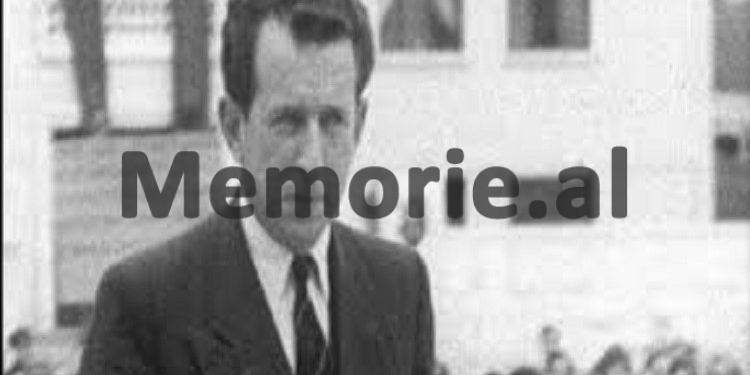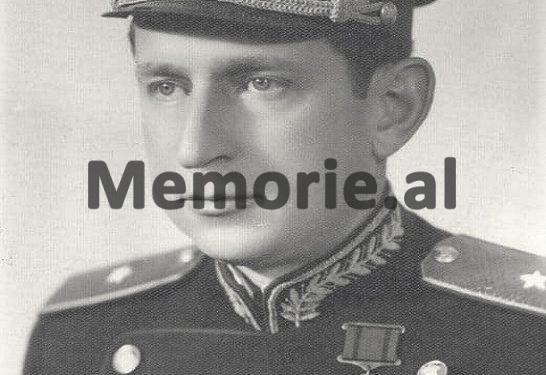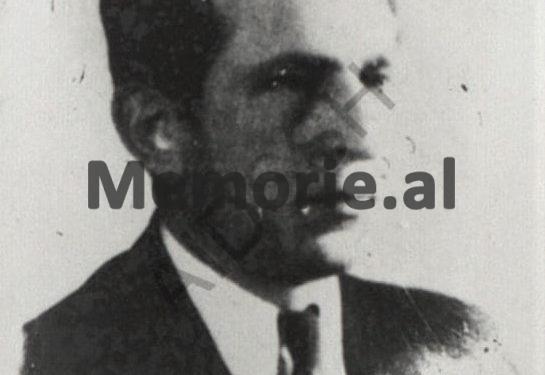The first part
Memorie.al / He dared to tell the truth and was barbarically crucified. He openly stated that Enver Hoxha was not elected Chairman of the NPSH at the founding meeting and ended up in the hell of the communist prisons. What happened to Tuk Jakova, one of the main protagonists of the beginning of the communist movement in Albania, is as painful as it is cruel. Mita Jakova and his friend, years ago, in a confession for the show “Histori me zhurmues”, of the well-known journalist and moderator, Pandi Laço, on “Klan” TV, reveal for the first time a complete retrospective of the tragedy, experienced by the former commissar of Mehmet Shehu’s First Assault Brigade.
With an admirable memory of age and the ordeal of suffering, Tuk Jakov’s wife talks about the circumstances in which she connected her life with him, who entrusted her with the task of the head of the first partisan unit, what were his relations with Mehmet Shehu, when they shared the responsibilities of the commander and the commissar of the First Assault Brigade, how the first conflicts with Enver arose and who initiated the sectarian attitude of the communist leaders towards him, to mitigate the class war and compromising relations with the Catholic Clergy, etc.
The suffering and drama after her husband’s conviction for “high treason against the motherland” occupies a special place in the story of Mita Jakova, who had to survive with her four children, with many hardships and extraordinary sacrifices.
However, from all the experiences of that terrible ordeal, this noble woman is hostage to the conditions in which one of the daughters died and the still unsolved mystery of how her husband died in the prison hospital, in the late evening of the 26 August 1959…!
What happened to Tuk Jakova, on the fateful night of August ’59 in the Tirana prison hospital, was never revealed. It was officially said that he died of a serious illness. Doctors, for their part, offered two other options: “Death after appendicitis surgery and from a sudden rupture of the gallbladder.”
50 years have passed since that tragic August night, and the circumstances in which the heart of Tuk Jakova, politically convicted for “high treason against the motherland” rested, are still suspicious. Family members, friends, acquaintances and co-sufferers continue to experience the early enigma with worry and pain.
Many of them continue to research for years in their own way, to penetrate even a little beyond the shadows of the murderous mystery. However, Mita Jakova, the friend of the martyred leader, who is overtired in the stress of all the dilemmas, is convinced that what happened on the night of August 26, 1959, was not a natural death, but a pure murder.
In her confession for Pandi Laço’s “Histori me zhurmues” show, on TV Klan, she reveals for the first time some of the truths related to the circumstances in which Tuk Jakova died in the prison hospital…!
Miss Mita! You are the wife of Tuk Jakova and you have been related to him since the war years. How do you remember the moment of the establishment of the Albanian Communist Party?
I met Tuk Yakova at the ceremony of the creation of the 1st Assault Brigade, which took place on August 15, 1943. There I saw Tuk for the first time, who spoke as the Brigade Commander. I was a young communist, who had been associated with the Anti-Fascist Movement since 1942 and worked in the inner city.
We were 15 friends, mostly young women, who were part of a squad. The commander of our squad was Kleopatra Mulliqi, a progressive woman who had embraced the Movement since its beginnings.
After the inauguration ceremony of the Brigade was over, Tuku, in the capacity of its commissar, called us girls and informed us that the brigade would start moving throughout Albania. Immediately, he ordered us to notify the families and arranged us in the tent of the brigade headquarters.
So we notified the families and took our belongings and settled in the headquarters tent. This was, so to speak, the first meeting with Tuku. During the following days, we were connected by work and communicated several times. I had the chance to talk closely with him, get to know him concretely, and without realizing it, I ended up in a close relationship. In May of ’44, we got engaged.
What qualities did Tuk Jakova have, who was appointed commissar of the First Brigade?
Tuku was one of the young people known in the illegal life of the city of Shkodra. His name was heard, especially for many brave actions against the occupier. In Shkodra of that period, there was talk especially about a case where Tuku and Sadik Bektesh were able to break through a dangerous siege, at a time when many knew they would be annihilated. In summary, I would say that the illegal life had made his name known, even beyond the city of Shkodra.
It was during the activity in the ranks of the illegal Movement that Tuku stood out for bravery and courage. He had a highly developed natural intelligence. In terms of education, he had a 9-year education, as we can say today. The truth is that, beyond his great desire for knowledge, he had no opportunity to get an education, due to economic reasons. From their family, the other three brothers were educated…!
Tuku was one of the central figures of the NPSH, why didn’t he go to study in the Soviet Union like the rest of the communist leaders of that period?
Tuku was never offered education in the Soviet Union, after liberation, at a time when many of his colleagues went there several times. This is exactly what we have been worried about as a family. One day I told Enver, when he was in our house; “How is it possible that Tuku is still not going like everyone else to be educated in the Soviet Union”?! He laughed, put his hand on my shoulder and replied as if with a smile: “If others have gone to different schools, Tuku has the school of life, the academy of experience”!
Tuk led the First Assault Brigade with another historical figure, Mehmet Shehu. What was the relationship with him?
The truth is, they had a lot in common. Both were distinguished for bravery and organizational skills. Both had the sympathy and support of all the partisans of the Brigade. However, there were also differences between them. Mehmeti, for example, was a very tough guy, very impulsive. Tuku was gentle by nature. It was quiet and laid back. Above all, he was very tolerant. There was a case, for example, during the fighting in Pogradec, where a significant amount of ballistic missiles were taken, which remained prisoners in the hands of the partisans.
At the very moment when the shooting was expected, Tuku ordered their release! Similarly, Tuku was a man who had a lot of influence in the people and people spoke in front of him, with their hearts in their hands. Especially the Catholic part, from which he was the only representative figure at those levels, respected him a lot and trusted him for everything. Tuku had very good relations with the Catholic Clergy and ensured fruitful cooperation with him in all situations. Precisely for these spiritual relationships, it was heavily criticized later.
It happened in a case that he met a Catholic priest in Tirana, who was in a very bad economic situation. He gave him one thousand lek to help him, at least to go to his house in Shkodër. He said this to Enver. Apparently, Enver didn’t like it, but as usual, he didn’t do anything. However, he could not forgive him, reserved him with his devilish way and one day penalized him severely. The truth is that Tuku, understood by Enver’s order, was beaten by his colleagues, not only for his sympathy for the Catholic Clergy, but also for material support to him.
This is where the first criticisms of him begin, right?
Tuku was criticized for the first time in the plenum of February 1951, as; “class war softener”. This came from his very nature. He met everyone. He waited for everyone who came to his office. He listened to their problems and tried to solve them. He was open to everyone, regardless of their political profiles and religious divisions. Yes, let’s stick to the first criticism that was made in that plenum, for softening the class war. This had already taken place in the report held at the beginning of the plenum.
The only one who was taken to speak after the presentation of this criticism was Mehmet Shehu. After a long silence, he left, addressing you to the hall: “Why don’t you talk about Tuku. For his bravery, I put my hands on fire. But Tuku is brave, only when he has the enemy in front of him”! In a word, he created the opinion that Tuku tolerates from unhealthy positions. During this time, Tuku was a deputy in Shkodër. As a rule, he had frequent meetings with the voters.
He listened attentively to their problems. It was a period when there were many complaints about unemployment. They raised this concern in different meetings. He committed himself with flesh and soul, to set in motion the structures of the state, to provide a solution to this concern, regardless of the biographies of the people who were looking for work.
Father Anton Harapi’s granddaughter came to his office one day. She, after clarifying the family’s political position, told him that at the very least, he needed an ordinary job, enough to cope with the family’s poverty. Tuku, regardless of which family this girl came from, intervened and set her up with a job in the town’s tailor shop.
They had started working there with his intervention and 15 other girls, who had a controversial political status at the time. But it happened that before much time had passed, all these girls together with the granddaughter of Father Anton Harapi, were fired from their jobs. The vigilance of the people of the Party, it seems, had done itself.
When Tuku found out, he was very angry. He immediately met Enver and told him that an event had happened, which shocked the whole of Shkodra. Could Enveri, who invented this nonsense himself, intervene?!
What were the tasks with which Tuk Jakova was charged after the liberation?
For a period, after the liberation, he was appointed president of the Trade Unions and from there, at the end of 1946, he was sent as a charge of work to the Yugoslav Federation. This, so to speak, was a departure from the center, from Tirana. He returned from Belgrade in 1948, at the time when the first Party Congress took place. At that Congress, he was elected to a very important post, such as that of the Secretary of the Central Committee of the Party, for the framework…!
What were the first dissatisfactions of Tuku, about the way the direction and development of Albania had started?
Dissatisfaction has been different. There were political dissatisfactions, there were economic dissatisfactions, there were dissatisfactions in relation to the class struggle, in relation to the Clergy, in relation to the writing of the history of the party, etc. I remember the first criticism, for the fact that it was against the rise of heavy industry.
It was indeed an interesting circumstance. Tuku, at the time he was the deputy prime minister, made several consecutive visits to the countries of the People’s Democracies, these intended in the field of economy. Surprised by their developments, he asked, not surprisingly, that; What did those countries have that were more advanced than our country?!
He shot them that during a delegation in Czechoslovakia, he had seen many centers of light and food industry, which were replacing existing technologies with new technologies. This is where the idea was born, that for our conditions, we needed it very much, to take them and install them in Albania. When he arrived in Tirana, he proposed to the government.
Simultaneously with this recommendation, Tuku opposed the project to set up heavy industry. “When we have no money, why should we embark on such an adventure”, he insisted, offering the expansion of the light industry and especially the food industry.
Then came the blow at the Plenum of April 1955, where it would be discussed to write the history of the Party for the first time. Before he talks about what happened in that plenum, I wanted to remember something, before his works.
At that time, I was in high school and I wanted to continue higher education. Despite being a mother of four children, I thought I had the opportunity to get an education. As I insisted on this in the official way, I was appointed to continue the Party school. We held lectures there, among others, the ones on the establishment of the party, which were among the most popular.
How was this issue treated in lectures?
The date of November 8, 1941 was mentioned and everything was dedicated to Enver Hoxha. According to them, the founding act was his work. The founder was Enveri. He and the General Secretary, since November 8, 1941, etc. One evening while I was talking with Tuku, I told him about this way, how the act of founding the Party was treated at school. He was indignant and immediately replied to me: “Every merit of the Party should not be linked to the name of Enver! That’s not the truth”!
Then Tuku calmly explained to me how he remembered this historical act. At the meeting for the establishment of the Party, a provisional committee of seven people was elected. So from that meeting, no single leader had been appointed. Enveri was elected guardian for finances.
Tuku, Kristo Themelkua and Koci Xoxja were assigned to deal with the formation of cells in different cities. Qemal Stafa, was appointed to deal with the youth. Gjin Marku with the army. Rrahman Çitaku, with the movement. So the meeting did not come out with a leading person, but with a provisional collegial body.
This is precisely what Tuku brought up at the Plenum meeting in April 1955. He referred to memory, as eyewitnesses of that historical event, for everything he spoke about. However, this was shocking for Enver Hoxha. Up to that period, he had not set out to argue with people who held views contrary to his own.
Tuku spoke openly, explaining that Enveri, at the founding meeting, was not elected as the party’s chairman or general secretary. The truth is, said Tuku, that from the creation of the party until 1942, the party was run by the provisional committee.
In April of 1942, other tasks were assigned and there, for the first time, the idea of creating partisan squads was thrown. Meanwhile, in March of 1943, in Labinot of Elbasan, the First Country Conference took place, where Enver Hoxha was elected for the first time as General Secretary of the Party, directly proposed by Miladin Popovici, who had given a very big help, for the fusion of communist groups and the creation of the party.
For all the main protagonists of the founding act of the party, Enver’s close relationship with Miladin was known. You saw them together everywhere. In the city, in the village, in various gatherings. They even shared almost the same attitude on the issues that arose. Undoubtedly, this reaction of Tuku, to tell the truth, could not pass without cost. But it was not only this, the first collision.
Miss Mita! It is said that Tuku made one of the first clashes regarding the way the National Liberation War Museum was organized?
It was on this occasion that Tuku created the next clash, with the senior leaders of the Party and the state. How the reorganization of the Museum of the Anti-Fascist National Liberation War had taken shape. When Tuku went and visited it for the first time, he was very impressed that there were not the main figures, not all the leaders who had led the Movement, but some figures who did not have any special merit.
Thus, for example, a prominent corner was occupied by Spiro Koleka, who came to the party from the “Fire Group” in 1943 and was close to the General Staff all the time. “With all the merits that Spirua has,” said Tuku, “he still has no place on that stand.” In the same way, Tuku’s attention was drawn to the fact that in the museum, there was nothing about nationalist groups, such as Riza Kodheli’s, so well known in the Korca area. Shall we go to the plenum now…! Memorie.al
The next issue follows














